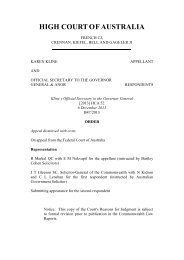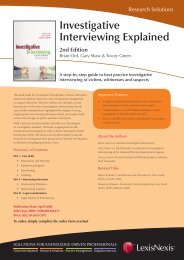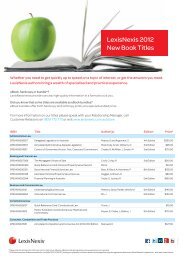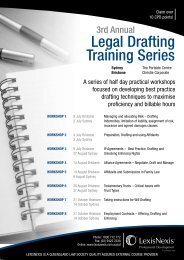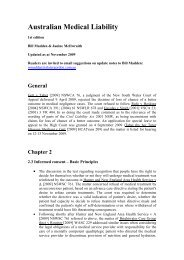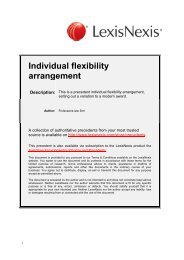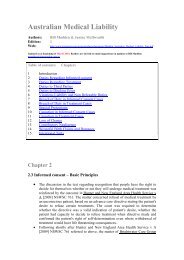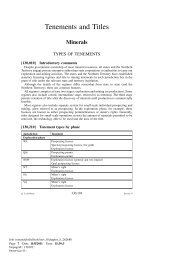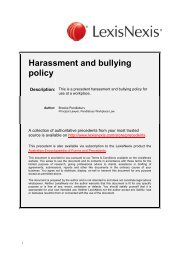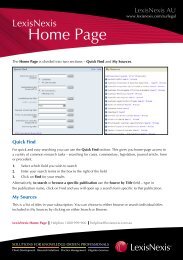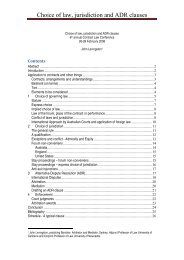Copyright LexisNexis. Sample only, not for classroom use or ...
Copyright LexisNexis. Sample only, not for classroom use or ...
Copyright LexisNexis. Sample only, not for classroom use or ...
Create successful ePaper yourself
Turn your PDF publications into a flip-book with our unique Google optimized e-Paper software.
273<br />
CHAPTER 12: EQUITABLE ESTOPPEL<br />
12.26 In Waltons St<strong>or</strong>es v Maher, the Mahers owned commercial premises in Nowra which Waltons<br />
was interested in leasing. Waltons wanted to relocate its business in Nowra to new premises and the<br />
Mahers’ site was available. The agreement that was reached was that the Mahers would demolish the<br />
existing premises and erect a new building to meet the specifications of Waltons. A draft agreement<br />
<strong>f<strong>or</strong></strong> lease was sent to the solicit<strong>or</strong>s <strong>f<strong>or</strong></strong> the Mahers. Some amendments were discussed. Waltons’<br />
solicit<strong>or</strong>s indicated that they expected their client’s agreement to the alterations and said they<br />
would let the Mahers know if the amendments were <strong>not</strong> acceptable. The Mahers’ solicit<strong>or</strong>s sent the<br />
amended lease, duly executed by the Mahers, to Waltons’ solicit<strong>or</strong>s ‘by way of exchange’. The letter<br />
was <strong>not</strong> acknowledged by Waltons’ solicit<strong>or</strong>s until two months later. The Mahers began to demolish<br />
the existing premises, as time was critical if they were to complete the demolition and rebuilding in<br />
time <strong>f<strong>or</strong></strong> the start of the lease agreement. Waltons was found to know what the Mahers were doing.<br />
However, after receiving the letter and executed lease, Waltons reconsidered its position and a few<br />
months later wrote to the Mahers’ solicit<strong>or</strong>s saying that the lease had <strong>not</strong> been executed by Waltons<br />
and that Waltons was <strong>not</strong> proceeding with it. The Mahers sued Waltons <strong>f<strong>or</strong></strong> damages <strong>f<strong>or</strong></strong> breach of<br />
contract on the basis that Waltons was estopped from denying the existence of the lease.<br />
12.27 The maj<strong>or</strong>ity of the High Court (Mason CJ, Wilson and Brennan JJ) found <strong>f<strong>or</strong></strong> the Mahers<br />
on the basis of equitable estoppel. (The min<strong>or</strong>ity of Deane and Gaudron JJ found <strong>f<strong>or</strong></strong> the Mahers<br />
on the basis of common law estoppel.) In finding in favour of the Mahers on the basis of equitable<br />
estoppel, the maj<strong>or</strong>ity did so in circumstances where there was no pre-existing contract between<br />
the parties and on the basis that the Mahers <strong>use</strong>d estoppel as the basis <strong>f<strong>or</strong></strong> a ca<strong>use</strong> of action and<br />
<strong>not</strong> merely as a defensive mechanism. In so doing, the High maj<strong>or</strong>ity removed the already <strong>not</strong>ed<br />
(see 12.15) limitations on the operation of promiss<strong>or</strong>y estoppel. In coming to their decision, the<br />
maj<strong>or</strong>ity made it clear that promiss<strong>or</strong>y estoppel was but a species of the broader principle of<br />
equitable estoppel — the other maj<strong>or</strong> species being proprietary estoppel. The underlying rationale<br />
<strong>f<strong>or</strong></strong> equitable estoppel was firmly based in the <strong>not</strong>ion of unconscionability <strong>or</strong> unconscientiousness:<br />
see 2.4–2.5. Mason CJ and Wilson J, at CLR 404; ALR 524, said:<br />
One may there<strong>f<strong>or</strong></strong>e discern in the cases a common thread which links them together, namely, the<br />
principle that equity will come to the relief of a plaintiff who has acted to his detriment on the<br />
basis of a basic assumption in relation to which the other party to the transaction has ‘played such<br />
a part in the adoption of the assumption that it would be unfair <strong>or</strong> unjust if he were left free to<br />
ign<strong>or</strong>e it’: per Dixon J in Grundt v Great Boulder Pty Gold Mines Ltd (1937) 59 CLR 641 at 675<br />
… Equity comes to the relief of such a plaintiff on the footing that it would be unconscionable<br />
conduct on the part of the other party to ign<strong>or</strong>e the assumption.<br />
ELEMENTS OF EQUITABLE ESTOPPEL<br />
12.28 The essence of the principle of equitable estoppel is equity’s concern with circumstances<br />
in which a plaintiff has acted to its detriment on the basis of a fundamental assumption where<br />
the defendant’s role in the adoption of that assumption by the plaintiff is such that it would be<br />
unconscientious to deny the plaintiff equitable relief. It is the defendant’s failure, having induced<br />
<strong>or</strong> acquiesced in the adoption <strong>or</strong> maintenance of the assumption, with knowledge that it would<br />
be relied upon, to fulfil the assumption <strong>or</strong> otherwise permit the plaintiff to avoid the detriment to<br />
which he <strong>or</strong> she has been exposed that makes the conduct of the defendant unconscientious and<br />
which attracts the intervention of equity.<br />
<strong>Copyright</strong> <strong>LexisNexis</strong>. <strong>Sample</strong> <strong>only</strong>, <strong>not</strong> <strong>f<strong>or</strong></strong> <strong>classroom</strong> <strong>use</strong> <strong>or</strong> distribution.<br />
Spi-Radan & Stewart - Principles of Australian Equity and Trusts 2nd ed. Ch.12.indd 273 10/10/2012 05:22:31<br />
200595



